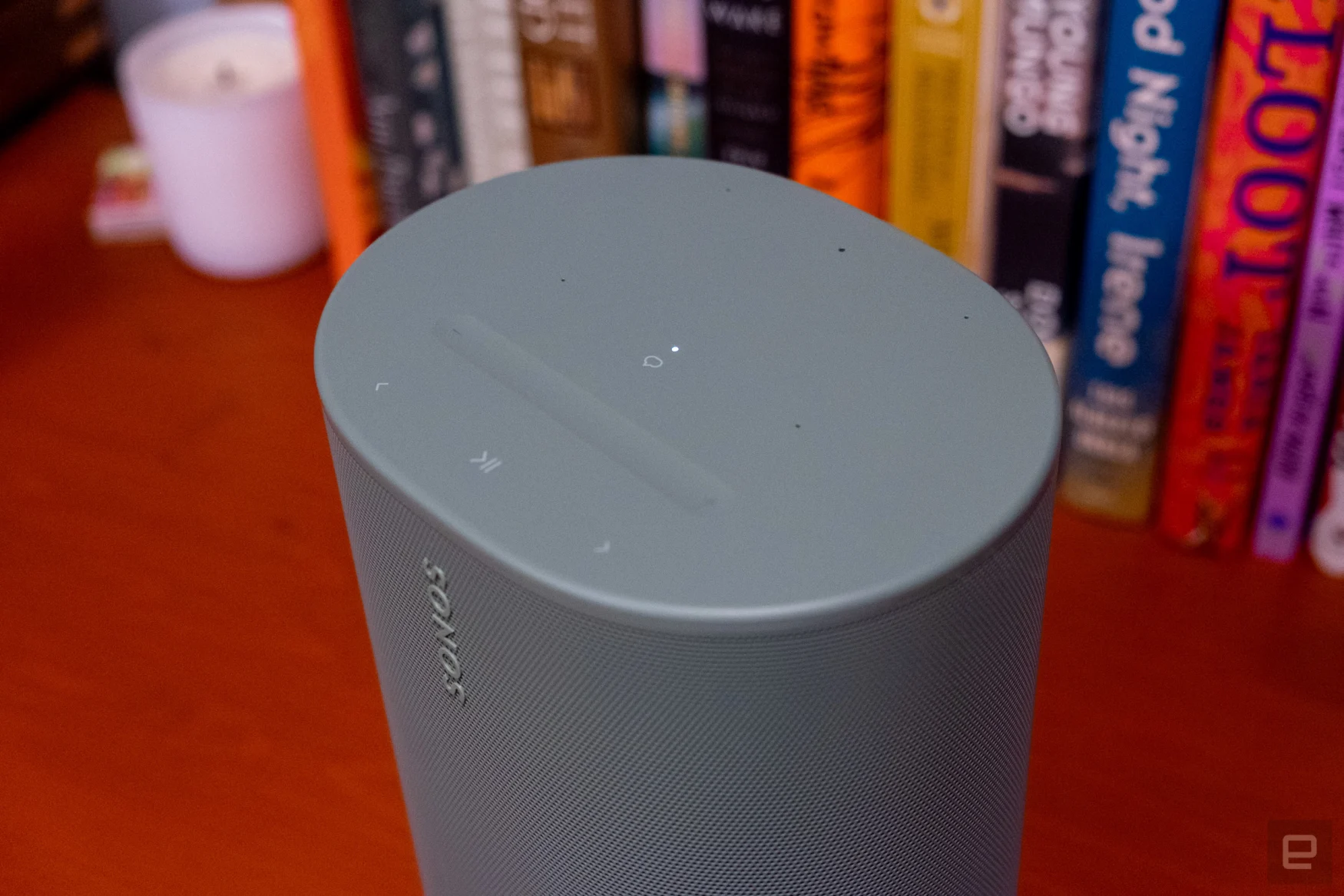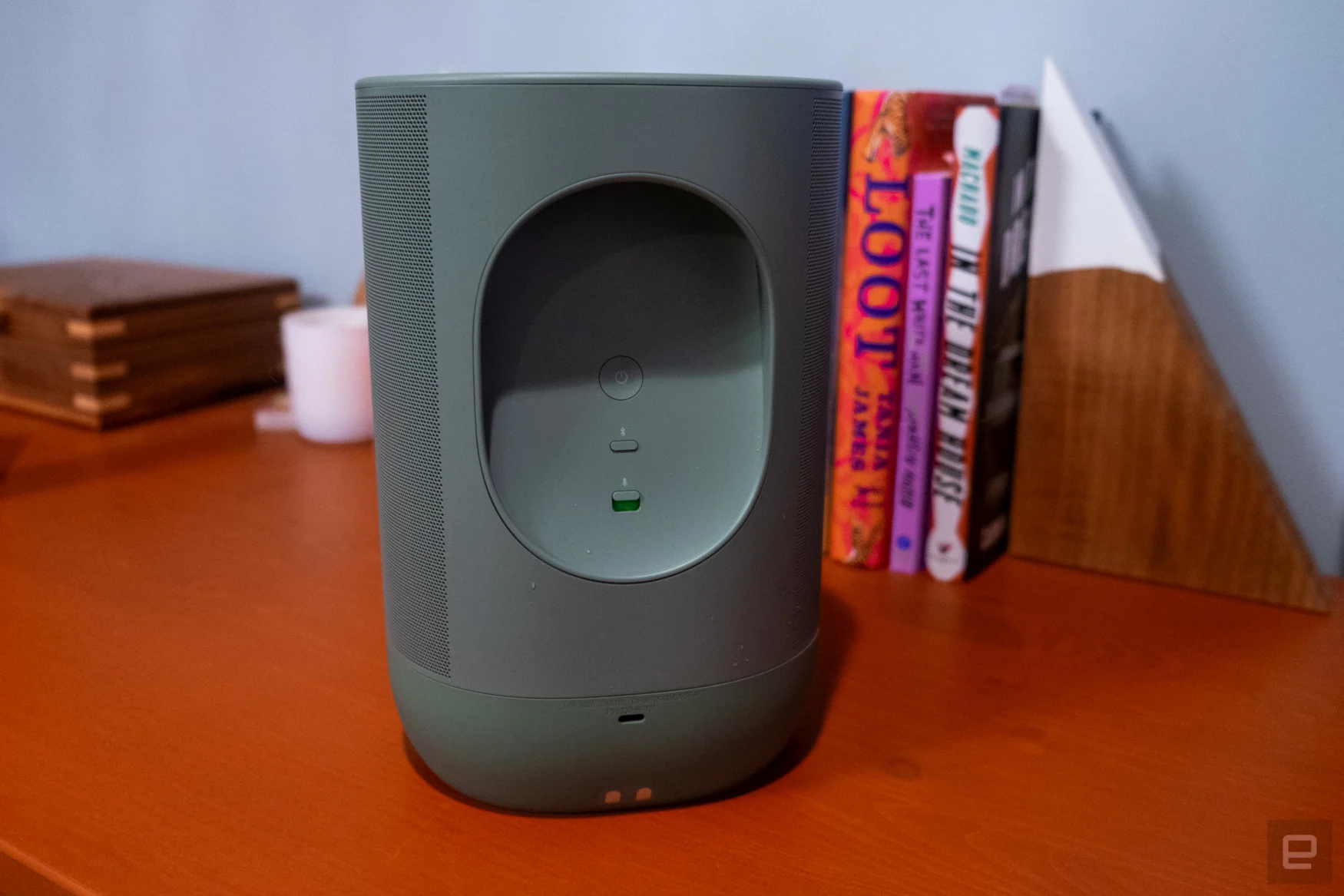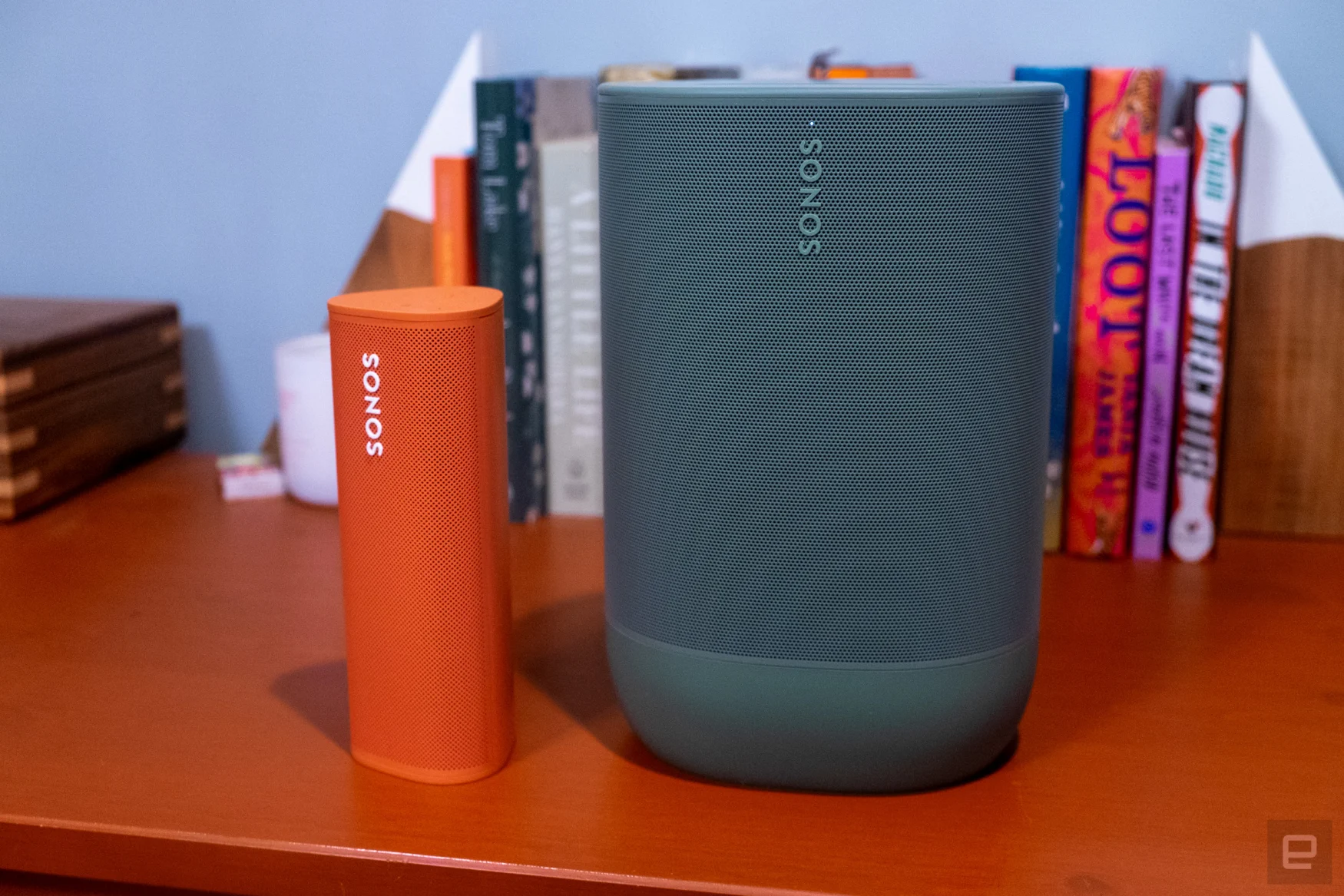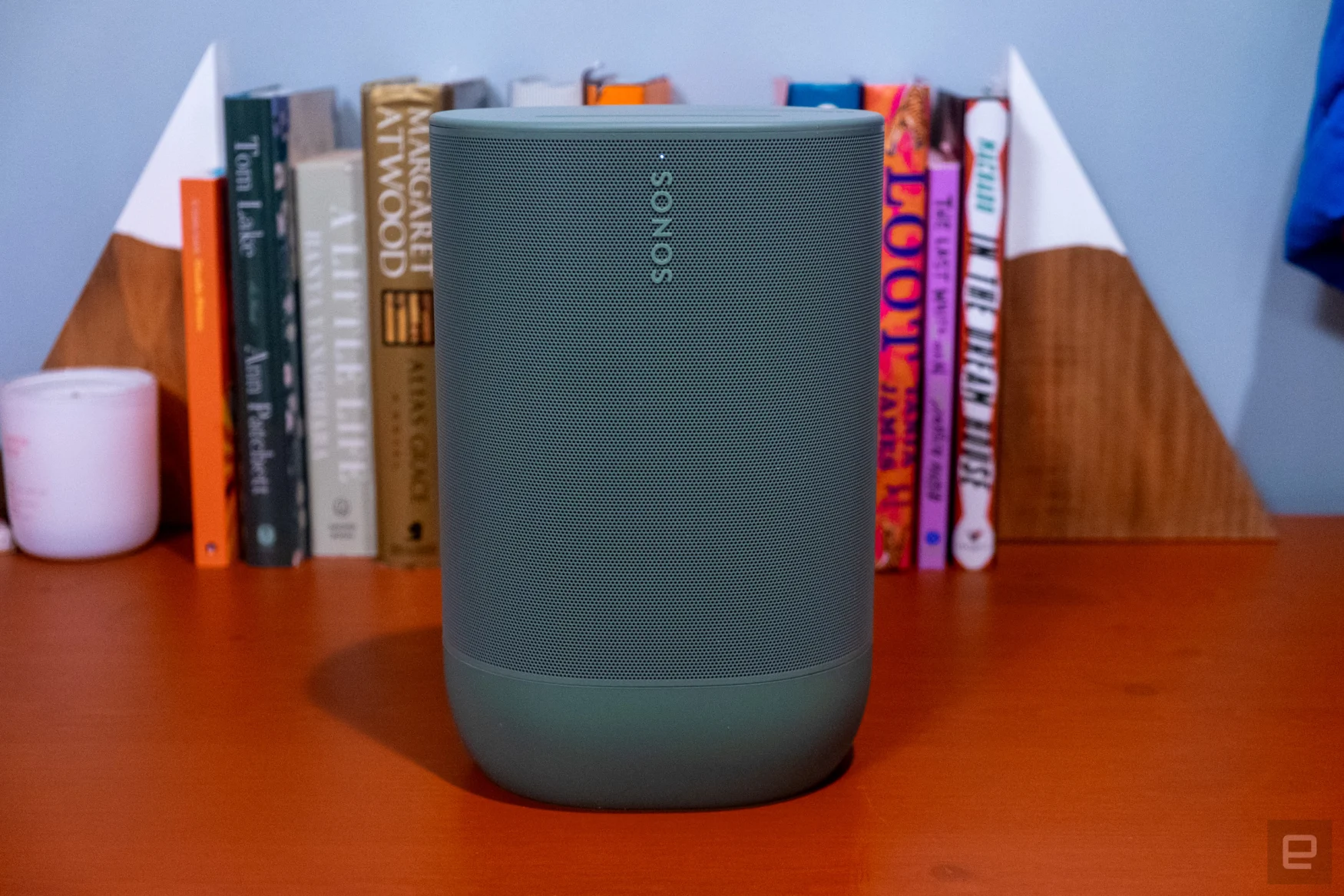When Sonos released its first portable speaker, the Move, four years ago, it was an anomaly. Previously, the company had looked down on Bluetooth as low-quality and unreliable, and all of the speakers it sold required a power outlet. The Move, on the other hand, used Bluetooth or Wi-Fi and had a 10-hour battery.
In 2023, these tricks have proliferated across the Sonos lineup. The more affordable Roam speaker brought the Move’s feature set to a much smaller device, while recent home speakers like the Era 100 and 300 both support Bluetooth, as well. As such, the recently-announced Move 2 doesn’t suggest a new direction for future Sonos products — it simply brings the company’s latest tech and design cues to an existing product.
Pros
- Excellent battery life
- Charges quickly
- Extremely durable
- Loud
- Improved sound quality compared to the original
- Line-in jack
Cons
- More expensive than the previous Move
- Too big to bring with you anywhere
And, as usual, it’s more expensive — at $449, it’s the same price as the Era 300, which is capable of spatial audio playback. It’s also more expensive than buying an Era 100 and a Roam. Given how Sonos has changed since the original Move, I’ve been trying to figure out what place — if any — the Move 2 has in the company’s lineup.
What hasn’t changed
At first glance, the Move 2 looks nearly identical to its predecessor. It’s a chunky and rather heavy speaker, weighing just over 6.5 pounds, and it’s noticeably bigger than the Era 100. That said, it’s identical in size and weight to the original Move, despite having redesigned internals. Given the speaker’s size and weight, I still see its potential use cases the same as four years ago: you can lug it around the house with the built-in handle and get loud, quality sound anywhere, or bring it outside to power a party in the backyard. But it’s clearly not a speaker you’ll take with you anywhere, like the tiny Roam, which you can tuck in a bag and mostly forget about.
As before, and like all other Sonos speakers, the Move 2 can stream audio over your Wi-Fi network from dozens of services through the Sonos app. If you have other speakers, you can stream the same music to all of them at once, or play different things on each. If you have two Move 2 speakers, you can set up a stereo pair. And for when there’s no Wi-Fi, the Move 2 has Bluetooth.
The Move 2 also has built-in microphones so you can command the speaker with either Alexa or Sonos’ own voice assistant. These also let the speaker automatically tune audio output to optimize sound quality. This auto Trueplay feature first arrived on the Move four years ago and is now available on many of the company’s products. In my experience, it definitely improves the speaker’s output, so I always turn it on. It’s particularly useful on a portable speaker that is constantly used in different spots.
Finally, the Move 2 is built to withstand the elements; its IP56 rating means it is dust- and water-resistant. You can’t actually drop it into a body of water (unlike the smaller Roam, which can survive a dip in the pool), but it’s just fine getting hosed down. It can also withstand a wide temperature range — Sonos said the first Move worked between 14 degrees F and up to 131 degrees F (-10 to 55 Celsius) and confirmed that the Move 2 has the same weather resistance as the original. That’s not something most people will need to worry about, but the Move 2 should survive a night outside in the winter if you forget to bring it in.

Photo by Nathan Ingraham / Engadget
What’s new
While you’d be forgiven for mistaking the Move 2 for the original, there are some significant changes on the inside (and some subtle ones on the outside). The speaker’s top touch controls have been redesigned to match the layout Sonos introduced earlier this year with the Era 100 and 300. Flanking the play / pause button are track forward and back buttons. Previously, you had to double-tap the play button to skip songs, and this is definitely easier. The volume controls are now a slider, but you can also tap the left or right side of the volume area for little adjustments. Finally, there’s a button to mute the speaker’s microphones. And for extra security, there’s also a physical switch on the back of the speaker that cuts power to the mics entirely.
There’s also a USB-C port in the back that can be used for charging or, with the right dongle, as a line-in jack. I hooked the Move 2up to my turntable with no issues, same as I did with the Era 100 and 300. My slight annoyance at needing a dongle is more than tempered by having this option at all — a year ago, only the $550 Sonos Five speaker had line-in, and now it’s available on most of the music-focused speakers Sonos sells.

Nathan Ingraham / Engadget
Oh yeah, and the Move 2 comes in olive green in addition to black and white!
Ultimately, there are two big changes that define the Move 2: an improved battery and all new speaker components. Sonos says that the Move 2 should last for “up to 24 hours” — and it seemed to blow past that in my testing. I had the speaker playing music over Wi-Fi for 22 hours and 50 minutes when I went to bed, and the speaker still had a whopping 46 percent of its battery left. When I checked in again 10 hours later, the battery was depleted, so it died sometime between those check-ins. But it’s safe to say you should get the 24 hours Sonos promises and more. That’s more than double the old Move, and more than sufficient for a speaker like this. I’m still testing the Move’s battery and will try and be awake when it dies next time so I can get a better handle on just how long it lasts.
Sonos again included a charging “ring” that you can just place the Move 2 in to power it up. It’s an elegant solution that requires no fiddling with cables. At first, I considered that it might be good to have two of them around the house, but honestly the battery lasts so long that I didn’t find it necessary to set up two “home base” spots. And you can charge it via USB-C, too. It’s not as clean and aesthetically pleasing as using the charging ring, but useful in a pinch.
The new speaker components seem to be inspired by the Era 100. Like that speaker, there are two angled tweeters to provide a semblance of stereo sound, as well as one midwoofer. The original Move, on the other hand, had a single downward-firing tweeter and a midwoofer. Thanks to the two tweeters, the Move 2 is technically a stereo speaker — but as with the Era 100, it’s nothing like the stereo separation you get from a pair of speakers. The fact that there’s no left-right balance control in the app for the Move 2 indicates that there’s only so much true separation between the two channels here, a fact of life given how close together the two tweeters are.
My go-to track for testing these stereo capabilities is “Such Great Heights” by The Postal Service, and the ping-ponging electronic intro and hard-panned vocals that jump between the left and right channels still more or less sounded like they were coming from a single spot. There’s a little space between them, but it doesn’t sound all that different from playing the song through the mono Sonos One speaker.
That quibble aside, the two tweeters in the Move 2 provide improved clarity over the original. It’s a clear, well-balanced speaker that faithfully reproduces sound across all ranges of the spectrum. Bass is prominent but not overdone, and the high end is distinct and detailed, especially compared to the original Move, which could get muddier than I liked. The Move 2 replicated the intricate details in delicate albums like Daughter’s Stereo Mind Game and End, the latest from Explosions in the Sky, and dance floor tracks like Dua Lipa’s “Don’t Start Now” and Tove Lo’s “No One Dies From Love” had plenty of low end power.
It’s also a very loud speaker – inside the house, I never really needed to turn it above 50 percent, except when I simply wanted to hear what it could do. Going much above 70 percent gets downright startling. But as with the old Move, Sonos gave this speaker extra oomph for outdoor spaces where sound dissipates much easier.
The main issue with the Move 2 is that you still sacrifice sound quality for portability. The Move 2 costs $449, the same price as the Era 300. That speaker has four tweeters and two woofers and can play back audio in Dolby Atmos. The whole spatial audio experience can be hit-or-miss depending on the quality of the mix, but even without that, there’s no doubt in my mind that the Era 300 is a more capable speaker.

Nathan Ingraham / Engadget
Another way you could spend that $449 would be to get an Era 100 ($249) and Roam ($179). That gets you an indoor speaker that sounds just as good as the Move 2 plus a portable speaker that’s much smaller and easier to take with you. To be clear, the Move 2 is far more powerful than the Roam, with better sound quality and the volume to fill a large outdoor space. The Roam, on the other hand, is for portable, personal use. It comes down to what you think you’ll need more: portability or power.
Despite my feelings that the Move 2 is somewhat of a niche device, a quick look at the market shows there are plenty of competing products with similar price points and features. Speakers like the JBL Boombox 3, Ultimate Ears Hyperboom and Bose Portable Smart Speaker all offer similar feature sets to the Move 2, and the Move 2’s vastly improved battery life means it should fare better than the earlier device in these comparisons.

Photo by Nathan Ingraham / Engadget
Wrap up
Due to its price and size, the Move 2 isn’t the ideal portable speaker for everyone. But that’s OK, because it does succeed as a speaker that you can rely on for high-quality and seriously loud audio. It’s well-suited to being your main speaker inside the house as well as something you can take to the porch or backyard to power a party. And while it won’t comfortably slip into a backpack, it should make a good road trip companion. I could definitely see tossing it in the car and bringing it on my summer vacation with me.
The battery and speaker upgrades make it a worthy improvement over its predecessor, as well, though I am disappointed to see Sonos raise the price yet again on one of its products. But if you’re looking for one speaker that can cover as many bases as possible, the Move 2 fits the bill — and it’ll be that much more useful if you have other Sonos products to pair it with.
Credit: Source link







